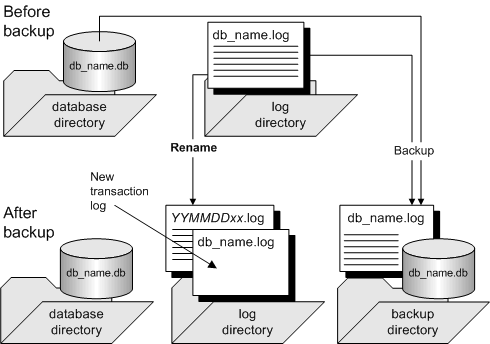If your database is part of a SQL Remote installation, the Message Agent must have access to old transactions. If it is a consolidated database, it holds the master copy of the entire SQL Remote installation, and thorough backup procedures are essential to ensure that no data is lost.
If your database is participating in a MobiLink setup using dbmlsync, the same considerations apply. However, if your database is a MobiLink consolidated database, old transaction logs are not required.
For synchronization and replication environments, you can choose backup options to rename and restart the transaction log. This kind of backup prevents open-ended growth of the transaction log, while maintaining information about the old transactions.
This kind of backup is illustrated in the figure below.

For more information, see Backing up and renaming the original transaction log.
Backup procedures are not as crucial on remote databases as they are on the consolidated database. You may choose to rely on replication to the consolidated database as a data backup method. In the event of a media failure, the remote database would have to be re-extracted from the consolidated database, and any operations that have not been replicated would be lost. You could use the Log Translation utility to attempt to recover lost operations. See Log Translation utility (dbtran).
Even if you do choose to rely on replication to protect remote database data, backups may still need to be done periodically at remote databases to prevent the transaction log from growing too large. You should use the same option (rename and restart the log) as at the consolidated database, running the Message Agent so that it has access to the renamed log files. If you set the delete_old_logs option to On at the remote database, the old log files are deleted automatically by the Message Agent when they are no longer needed. See delete_old_logs option [SQL Remote].
 Automatic transaction log renaming in SQL Remote
Automatic transaction log renaming in SQL Remote |
Discuss this page in DocCommentXchange.
|
Copyright © 2012, iAnywhere Solutions, Inc. - SQL Anywhere 12.0.1 |